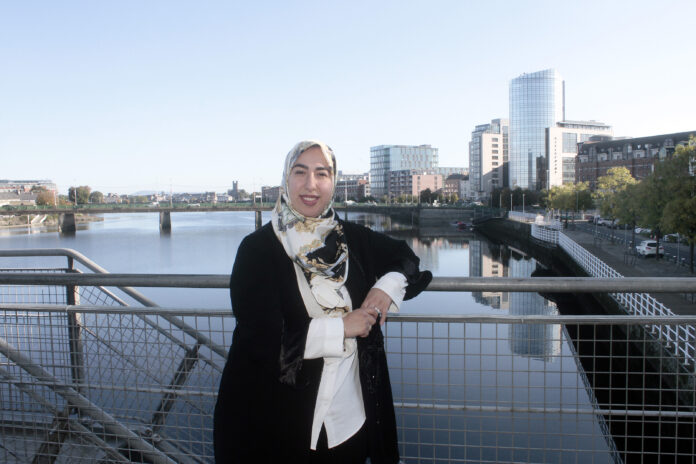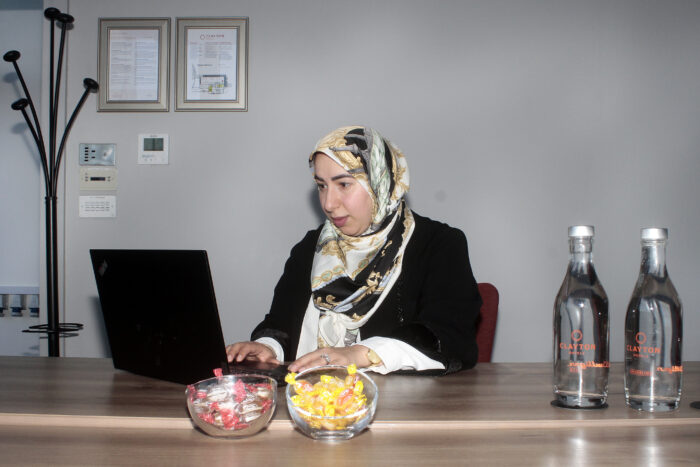
SOME journeys, they say, take you farther from where you come from, but closer to where you belong. This is certainly true of Tahereh Fardin Tabrizi, an Iranian woman who has made a new life for herself and her family in Limerick, writes Limerick Post reporter Alan Jacques.
Working as a case worker and projcet coordinator with migrant and refugee organisation Doras since 2021, Tahereh, an international law graduate specialising in human rights, was all smiles and warm welcomes when I met her recently. Her work sees her helping migrants and refugees access employment and overcome challenges on their arrival into Ireland.
We meet at a spacious and bright room at the Clayton Hotel in the heart of Limerick City overlooking the Shannon River, where Doras hosts its weekly outreach clinics. Sitting down with Tahereh, I am immediately struck by the Limerick lilt in her exotic accent. The nasal, cutting Shannonside inflection has clearly left an impression on her.
After offering me sweets from a bowl on her desk as a considerate icebreaker, the easy-going Mungret-based mother of one openly tells me about her journey to this point in her story – one brimming with different cultures, languages, and spices.

- External Walls: Up to €8,000 Grant
- Attic: Up to €1,500 Grant
- Cavity Walls: Up to €1,700 Grant
- Internal Dry Lining: Up to €4,500 Grant
“I was born in Iran. My parents were Iranian. My mom was what we call a Persian Iranian, and my dad was a Turkish Iranian or Azari Iranian, as they call them,” she explains.
“Their language would be Azari, exactly the same language spoken in Azerbaijan. My parents fell in love during the Iran Iraq war in a Kurdish region, got married and had three children.
“When I was seven, my father was offered a position for a textile company based in Zimbabwe, and that’s how our journey started,” she recalls matter of factly.
“We lived there for about seven years. After that, he was offered a position at one of the universities in South Africa, and we went there. So I did my primary schooling in Zimbabwe and I did my high school and tertiary education in South Africa.”
Tahereh married in South Africa, moving to Ireland five years ago when her husband was offered a job here.
A woman on a mission
To date, she has worked with the UN Refugee Council in Iraq and Afghan refugees in Iran. She currently sits on the board of AkiDwa (a national network of migrant women living in Ireland), ADAPT (a Limerick charity supporting women survivors of domestic abuse), and AMDAF (an advocacy group for women of African descent). She also volunteers as a translator for Afghan and Iranian communities and supports the Rape Crisis Mid West Centre.
Tahereh says her mission through her work with Doras is to establish a community that supports, scales up, and inspires migrants across Ireland to pursue their professional aspirations.
With her Master’s degree in International Law, she has worked with other migrant organisations in Iran, Iraq, and South Africa before her time with Doras.
“I used to work in the court system as an interpreter, and also give legal advice for some of the Iranian families that were based there. So I always had an interest in human rights. When I came to Ireland, I decided to move into that field,” she says.

A real Irish question
Tahereh and her husband first arrived in Ireland not long before the onset of the Covid-19 pandemic saw the whole island in lockdown, making it harder for the couple to adjust to life in their new home with travel and social engagements put on hiatus. But blessed with fine weather, as we were during the brief seclusion, it gave the new arrivals a deep-rooted appreciation for the nature all around them as Tahereh’s inherent inquisitiveness soaked up her beautiful County Limerick surroundings.
“It’s funny, you mentioned something earlier, and I think it’s a real Irish question – ‘where are you from?’” she shoots back at me.
“I get that question a lot. But I’m one of those people, and I probably asked that question of many people as well, because I’m always so inquisitive about people’s history. I think it’s part of your identity. I cannot deny the fact that my roots are Iranian, but that I also have a South African part to me.
“I think curiosity is good because, if you’re not curious, you stay in your ignorance. And ignorance can create those perceptions that we don’t want, it also creates a sense of generalisation.
“If I look at myself, I’m a Muslim woman that is originally from Iran, but has a South African identity, and now mixed with an Irish identity.”
‘She became my Irish mammy’
Tahereh admits that her ability to speak English fluently made her move to Ireland easier, but it was the openness of the Irish people that made the real difference for her and helped her set down firm roots.
“When I lived in Ennis, I had two wonderful Irish neighbours who are now my friends. One of them was a 73-year-old lady. She became my Irish mammy, and, to this day, she treated me like part of the family. When her husband passed away, I remember sitting in the front row in the church because I was her family. That was really beautiful.”
Tahereh believes that everyone should try to look beyond the stigmatisation that is often placed on migrant women and instead celebrate their unique identities, stories of courage, hope, and resilience.
Being a woman, a mother, and having a migrant background, with everything it entails, isn’t always easy, she admits. Tahereh says that she often has to prove her worth on a daily basis and has faced non-supportive views and even discrimination because of her appearance, especially with the Hijab.
A strong, resilient and empathetic soul, she tells me that she has discovered that she can overcome all this by improving and using her skills and educating herself constantly.
“We engage a lot with other human rights organisations, not only in Ireland, but also within Europe, and further even,” she says of her work with Doras, who are based on The Crescent in Limerick City.
“Being able to be the voice for people whose voices are not being heard, and the advocacy part for me, specifically in my role, it’s very, very important.
“We try to assist individuals to overcome the challenges in finding employment, because, you know, people have layers of barriers. It can be language barriers, it can be lack of information, it can be lack of local contacts.
“I went through the journey of trying to find employment, and I was unemployed for one year, and when I initially came into the country, I was on a visa that didn’t allow me to work. So I found that a struggle. But after one year with a different visa, different doors opened for me. I found that my journey might be able to help people, even though my journey is obviously not like everyone else’s pathway into Ireland.”
‘We have it in our own country as well’
The Doras case worker says that those she works with “come from different backgrounds and a huge number of the people that we work with are traumatised”.
“They can’t necessarily pick themselves up easily in the beginning when they come to Ireland with a totally different culture, different language, and different structure. Many need guidance.
“You see, if I had grown up in Iran, I would be very much similar to other Iranians, because we have many different tribes and languages and stuff within Iran. And we have one of the biggest Afghan migrant communities in the world, but we still have our stigma. So when I see the Far Right here, I’m like, ‘Oh, we have it in our own country as well.’ But that doesn’t mean that all the Irish are like that, and that’s one important thing to remember.
“If I had only grown up in that mindset, I wouldn’t have been as inquisitive as I am now. But because of my experience in South Africa, and now on my own personal journey, it’s made me want to ask, ‘where are you from?’”

